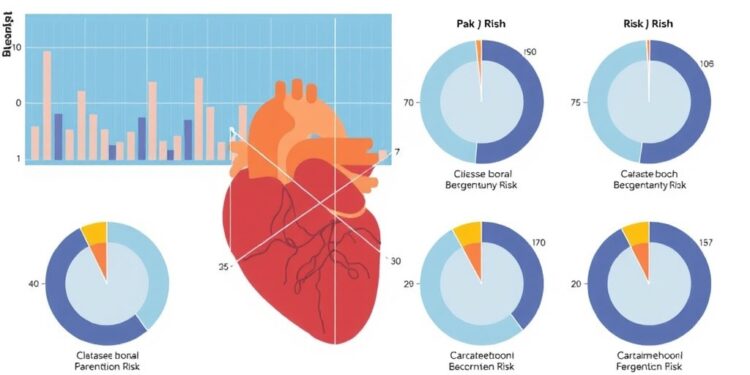In the burgeoning field of epigenetics, recent research has illuminated the intricate relationship between chemical modifications that influence gene activity and the risk of developing cardiometabolic diseases. These diseases encompass a range of conditions, including hypertension, diabetes, and obesity, which have seen rising prevalence rates over the past decade. Given the persistent challenges in managing these health issues despite advancements in treatment options, there is an urgent need to innovate early detection methods and personalized interventions. The implications of such findings could profoundly alter the landscape of preventive healthcare.
The study, conducted by a team of researchers and published in the journal "Epigenetics," is titled “Poly-epigenetic scores for cardiometabolic risk factors interact with demographic factors and health behaviors in older US Adults.” This investigation focuses on the concept of poly-epigenetic scores (PEGS) that serve as a composite measure of multiple epigenetic modifications. The researchers posited that these scores would better capture how individual susceptibility to cardiometabolic diseases can be shaped not only by genetic predisposition but also by environmental factors and lifestyle choices.
Utilizing data drawn from the Health and Retirement Study, which encompasses over 20,000 adults aged 50 and above, along with DNA assay measurements from a subset of participants, the research included 3,996 individuals for the main analysis. The sample’s demographics and health behaviors were scrutinized, looking at factors such as age, sex, education levels, smoking habits, alcohol consumption, and levels of physical activity. This robust dataset allowed for a thorough analysis of how these variables interact with PEGS to influence key health markers like body mass index (BMI), cholesterol levels, and inflammatory responses.
The findings from this comprehensive analysis indicated that the associations of PEGS with BMI, high-density lipoprotein (HDL) cholesterol, and triglycerides were notably stronger among younger populations. This suggests that interventions aimed at younger demographics might yield more immediate and pronounced health benefits. Interestingly, gender differences emerged, with female participants showing a more significant impact of PEGS on BMI and HDL cholesterol levels compared to their male counterparts. Such distinctions highlight the necessity for gender-specific strategies in public health interventions.
Furthermore, education levels played a pivotal role in moderating these relationships. Individuals with a high school education exhibited a notably stronger association between PEGS and C-reactive protein (CRP) levels. CRP is a well-established inflammatory marker linked to increased heart disease risk, thus underscoring the importance of educational attainment on health outcomes. The data suggest that lower educational levels may correlate with poorer health literacy, potentially influencing lifestyle choices such as diet, physical activity, and smoking behavior.
A particularly striking aspect of the study was the finding that current smokers demonstrated a more substantial relationship between PEGS and HDL cholesterol levels. This observation indicates that smoking could modify the effects of epigenetic markers on cholesterol metabolism, suggesting that tobacco use may exacerbate or alter the biochemical pathways associated with cardiometabolic disease risk. This insight reinforces the critical importance of addressing smoking cessation within broader public health initiatives aimed at reducing cardiometabolic disease prevalence.
The lead author of the study, Dr. Lisha Lin, emphasized the overarching theme of the findings: genetic risk is not static or predetermined. Instead, the research illustrates that lifestyle choices and environmental exposures play instrumental roles in shaping health trajectories. This paradigm shift toward a more integrative understanding of health risk underscores the potential for implementing personalized medicine approaches that incorporate epigenetic markers into routine risk assessment protocols.
In the realm of precision medicine, utilizing PEGS could pave the way for tailored prevention strategies that account for individual characteristics such as demographics and health behaviors. This approach represents a transformative opportunity to refine early detection methods, allowing healthcare providers to identify individuals at heightened risk early in their health journey. From these insights, future research may focus on developing targeted interventions that empower individuals to take proactive steps toward better health.
The significance of this study lies not only in its scientific findings but also in its potential to influence clinical practices and public health policies. By intertwining genetic, environmental, and behavioral insights, the study advocates for a comprehensive framework in addressing cardiometabolic diseases. Integrating PEGS into health assessments could help prioritize interventions that align with individuals’ unique profiles, enhancing the efficacy of prevention efforts and ultimately improving quality of life for many at risk.
Looking ahead, the researchers foresee these findings contributing to a broader strategy of personalized medicine that includes genetic counseling, lifestyle modification programs, and enhanced patient education. They hope that the incorporation of epigenetics into traditional risk assessments could catalyze a future where healthcare is more preventative rather than reactive. This evolution in healthcare paradigms may redefine the methodologies employed in managing chronic diseases, fostering a healthier population through informed, data-driven decisions.
As the study continues to garner attention, it raises numerous questions about the future of health research and the role of emerging sciences like epigenetics in comprehending the complexities of human health. It will be essential for additional longitudinal studies to confirm and expand upon these findings, ultimately leading to more comprehensive recommendations for public health initiatives that cater to the growing needs of our aging population.
In summary, this innovative research provides a glimpse into the potential of poly-epigenetic scores to reshape how we understand and prevent cardiometabolic diseases, urging us to consider how we might better integrate scientific advancements into everyday healthcare practices.
Subject of Research: People
Article Title: Poly-epigenetic scores for cardiometabolic risk factors interact with demographic factors and health behaviors in older US Adults
News Publication Date: 20-Feb-2025
Web References: Link to Article
References: National Institute on Alcohol Abuse and Alcoholism, NIH/National Heart, Lung and Blood Institute
Image Credits: Not provided
Keywords: Cardiometabolic diseases, epigenetic markers, precision medicine, poly-epigenetic scores, chronic disease prevention.




